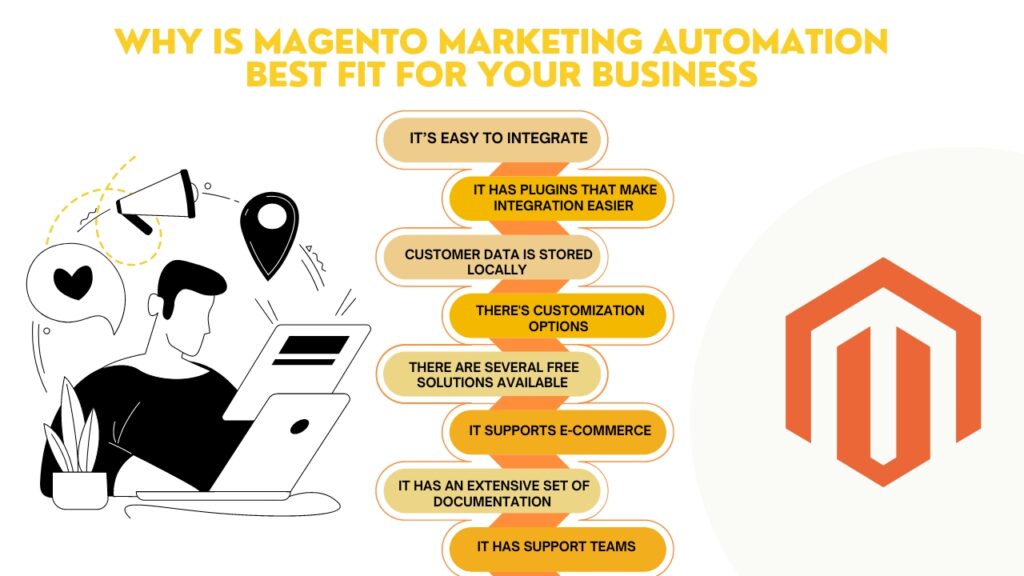Magento eCommerce software has become very famous because of its user-friendly interface. Nowadays, it has over 50 million users worldwide and provides the necessary tools for businesses to manage their online stores.
But how important is Magento Marketing Automation? One of the things that makes Magento popular is its ease of setting up new accounts, creating orders, adding items to cart etc. Here Magento Development company will guide you properly
With the help of Magento module development services, you can automate many tasks during the customer journey. This allows you to save time and resources while improving conversion rates. Want to know how? Read the blog till the end.
Why Is Marketing Automation Skyrocketing These Days?

How important is Marketing Automation? The answer is simple, “It’s very important.” In today’s digital age where businesses are bombarded with email and social media messages from potential customers every day, having a strong marketing strategy is essential. And the best way to achieve that goal is through marketing automation.
No matter what type of business you run, chances are good that you will rely on marketing automation at some point during your company’s growth. From customer acquisition to retention to sales conversion, companies of all sizes use marketing automation systems to automate repetitive tasks and increase overall productivity.
According to Magento development Service provider Marketing automation has become an integral part of the modern business landscape because it allows companies to create personalized interactions with their consumers and streamline processes without human intervention.
Why Is Magento Marketing Automation Best Fit For Your Business?

1. It’s Easy to Integrate
There are many open-source and paid solutions out there for marketing automation (MA), but they are often difficult to set up and integrate into different CMS platforms. If you struggling then you can take a help of Magento development company
Magento is not only built using PHP, but also uses a MySQL database backend to store its data. Additionally, Magento development offer several extensions that allow for integration with third-party applications including e-commerce shopping carts, payment gateways, etc., which makes it easier to connect these systems together than integrating with other MA solutions.
2. It Has Plugins That Make Integration Easier
Plugins make it possible to customize how content appears on a webpage. In Magento, plugins work off of a “module” system—that is, each module contains a collection of functionality. Each module is assign a number that indicates how high up in the hierarchy of modules it sits.
A module might not necessarily have more functionality than another one, but because it is higher in the hierarchy, it would appear at a lower location in the code editor. When the customer activates a plugin, it executes the function. If no function is provided for the plugin, then the default behavior will occur. You can use this feature to activate custom logic whenever someone performs an action. This means you could automatically log users in after they register, send welcome emails, create account settings pages, and so forth.
3. Customer Data Is Stored Locally
Because Magento stores customer information locally, you don’t need to worry about storing customer details remotely. However, if you do opt for remote storage, the data sync can take place between your online and offline databases. Another benefit of having the data stored locally is that you can access it directly without needing any kind of API or additional software.
4. There’s Customization Options
You have numerous customization options to enhance the look and feel of your webpages. These include design templates and themes, JavaScript files, CSS stylesheets, HTML markup, XML-based layout updates, and more. By combining Magento’s theme and template structure with the WordPress REST API, you can easily update the appearance of Magento pages based on changes made to WordPress posts and pages.
5. There Are Several Free Solutions Available
The Magento Community Edition is free to download and use. It includes all of the core modules that power Magento’s features along with an assortment of add-ons that let you expand the capabilities of your website. All of the features are included, but some may require an advanced knowledge of coding languages to fully utilize them. An extension is a piece of code that enhances the functionality of a core module. Extensions are created and developed by third parties and can be purchased separately.
6. It Supports E-Commerce
According To Magento Development company When it comes to running an online business, having e-commerce functionality is paramount. The Magento platform supports both single product and multi-product sales. You can also sell digital items, downloadable products, membership plans, and subscriptions—all via Magento.
7. It Has an Extensive Set of Documentation
A great resource for learning how to use Magento is the official documentation page. Also, Magento has a community forum where experienced developers share their tips and tricks with others who want to learn more about the platform.
8. It Has Support Teams
If you run into problems while working with Magento, you can contact Magento’s technical support team for assistance. The Magento community forums are also a good place to ask for help.
If you are looking to outsource the development and designing part to the expert Magento Development company, Tech2Globe certainly is your go-to agency.










